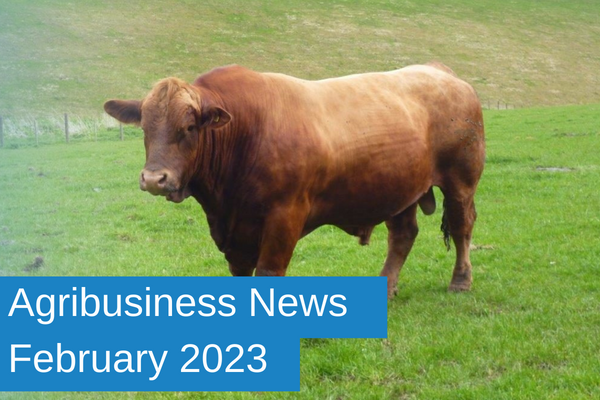Agribusiness News February 2023 – Management Matters: Not a Lot of Bull!
2 February 2023Jobs for the boys!
There aren’t many jobs advertised where you get your board and lodgings, lots of fresh air and exercise and only need to work for 9-12 weeks a year. However, it is not all a bed of roses for a stock bull, hidden in the unwritten small print, failure to perform often leads to death not just dismissal as the stakes are high: no calves, no income.
Based on the recommended Key Performance Indicators (KPIs) for suckler herds, to achieve a compact calving period i.e. 95% of cows calving within 9 weeks, a mature bull should be capable of successfully serving 30-40 cows within a 9-week period, and at least 65% in the first 3 weeks of the breeding season.
With the bull sale season upon us and just a few months before bulls are called on to carry out their full year’s work in just 2-3 months, from a management perspective, new and existing bulls need to be physically and physiologically fit.
Size does matter
Bull fertility is linked to structural soundness, the size of reproductive organs, semen quality, libido, nutritional status and the bulls age and stage of maturity.
While Estimated Breeding Values (EBVs) give an indication of the bull’s potential, it is a well-documented fact that selecting bulls for increased scrotal circumference should increase inherent fertility in both male and female progeny. For males, there is a significant correlation between scrotal circumference and both sperm cell volume and the percentage of normal sperm. For females, earliness of puberty in heifers is strongly linked to the scrotal circumference of their sire.
The BCVA Bull Pre-Breeding Examination Certification Guidelines for age and minimum scrotal size are:
But size isn’t everything
In a 3-year trial run by SRUC Vet Iain Mccormick, it has been found that on average, 1 in 5 bulls fail a fertility test irrespective of age or breed; young bulls fail just as much as older ones. While bulls often fail for more than one reason; 80% are due to problems with sperm morphology and motility.
The percentage of normal size and shaped sperm seems to decline by ~ 5-6% per annum for bulls that have consistently passed previous year’s tests.
Nature or nurture?
Getting bulls routinely screened for fertility (spermiogram) will highlight a potential problem before the breeding season starts. However, given that a mature sperm has been ~60 days in the making, ensuring that each bull is in good condition and stress free a minimum of 3 months before the start of the breeding season will give him the best chance of having a successful breeding season.
All is not lost if a bull fails a spermiogram. If there are no obvious physical abnormalities of testes, or history of environmental/toxic/stress, a bull can be re-assessed after 60 days (full spermatogenesis cycle) to judge if their fertility has improved. This time frame can also be used to recheck diets and living conditions to ensure there are no underlying environmental factors.
As the cost of a fertility test is small compared to the value of a calf, speak to your local vet practice about giving the boys a home visit to check that they are able to meet their contractual obligations this season.
Sign up to the FAS newsletter
Receive updates on news, events and publications from Scotland’s Farm Advisory Service


